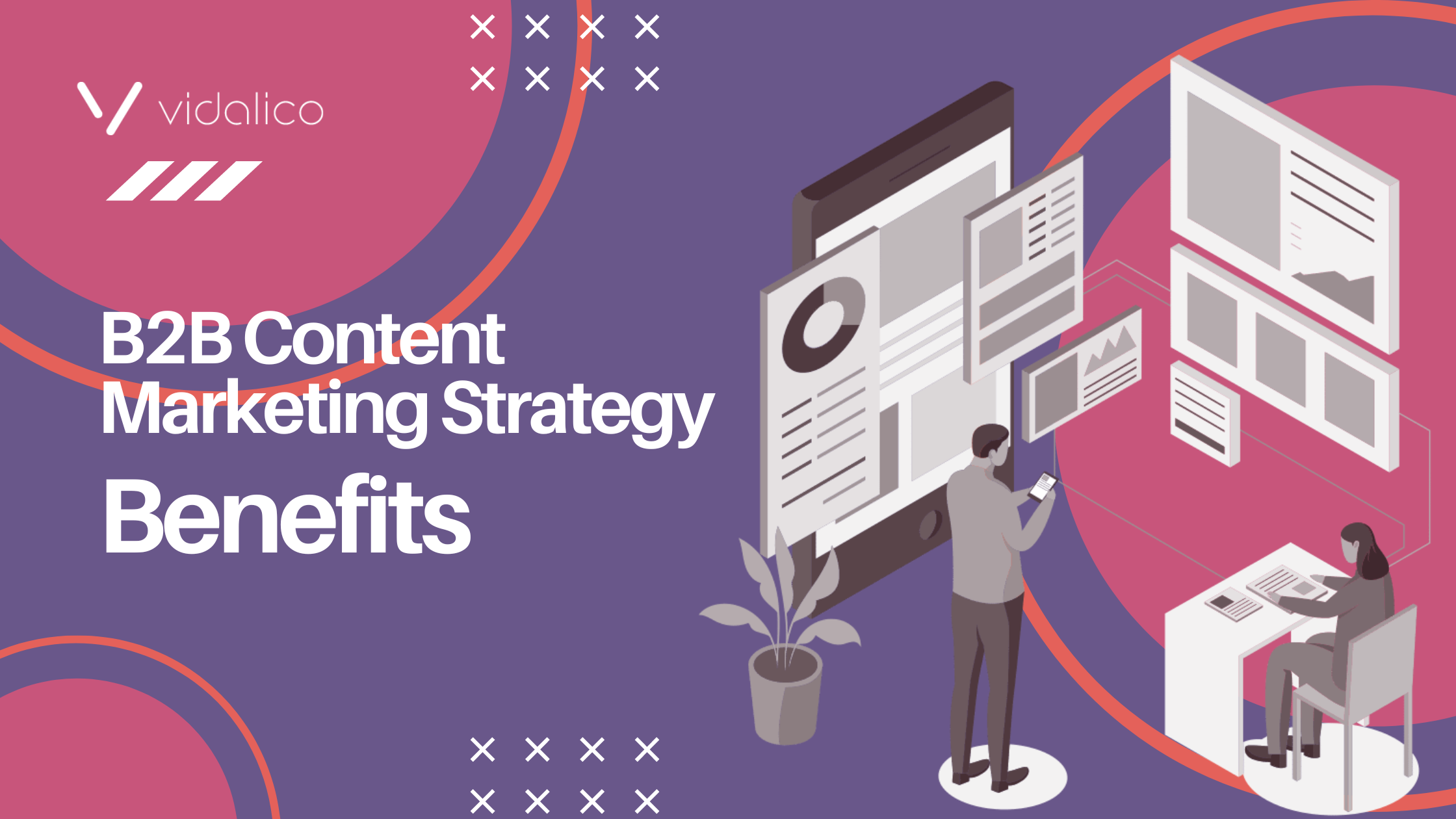Unless you’ve been living under a rock, you’ve undoubtedly heard the phrase, “B2B Content Marketing Strategy”, and probably seen some material on the topic too.
A B2B content marketing strategy should be a main component of, as well as go hand-in-hand with, the overall objectives of your company. Due to the integral nature of a B2B content marketing strategy, it’s important to have a strong grasp of the basics of this complex topic.
What is B2B Content Marketing?
B2B content marketing involves marketing to other businesses by creating content that generates leads, establishes brand preference, and positions your business as a thought leader in your industry and market.
B2B content marketing differs from B2C content marketing in that it’s not only about sales, but also about building and sustaining connections with your prospects at each stage in their journey. It’s the long game of marketing strategy.
Why you need a B2B content marketing strategy
Content marketing contributes to making your business known for being useful and important in your industry; your content strategy drives lead generation in the long term and helps your brand build trust, credibility, and integrity. Implemented well, the content marketing strategy will end up supporting the overall growth and strategy of your business.
Consider this, with a B2B content marketing strategy, you may be reaching a company at several different touch points throughout their buying process. The time and effort you put in now are making a lasting impression that your company will reap benefits from, not just in the short term, but also for months, or possibly years ahead.
Content marketing is an essential aspect of the lifeline of your company and how you can be visible, helpful, and memorable to your customers and prospects alike.
In today's highly competitive business landscape, B2B companies need a robust content strategy to stay ahead of the curve. Regardless of if you are just starting with content marketing or you are looking to re-evaluate your strategy, this 7-step guide can help you plan and start with your B2B content marketing strategy.
Seven steps for a successful B2B Content Marketing Strategy
Step 1: Identify your target audience. The first step in creating a successful B2B content marketing strategy is to identify your target audience. Who are your ideal customers? What are their pain points and challenges? What are their interests and priorities? Understanding your target audience will help you create content that resonates with them and addresses their specific needs.
Step 2: Define your goals. Once you have identified your target audience, it's important to define your goals for your content marketing strategy. Are you looking to generate leads, increase brand awareness, or establish your business as a thought leader in your industry? Defining your goals will help you measure the success of your strategy and adjust it as needed.
Step 3: Develop a content plan. Based on your target audience and goals, develop a content plan that includes topics, formats, and channels for distributing your content. Consider the different stages of the buyer's journey and create content that addresses each step, from awareness to consideration to decision-making.
Step 4: Create high-quality content. To succeed in B2B content marketing, you need to create high-quality content that provides value to your target audience. This means creating content that is informative, educational, and helpful. Consider using a mix of formats, such as blog posts, infographics, videos, and webinars, to keep your content fresh and engaging.
Step 5: Promote your content. Creating great content is only half the battle. You also need to promote your content to get it in front of your target audience. Consider using social media, email marketing, and paid advertising to promote your content and reach a wider audience.
Step 6: Measure and analyse your results. To ensure the success of your B2B content marketing strategy, you need to measure and analyse your results. Use tools like HubSpot CRM Platform or Google Analytics to track website traffic and engagement with your content. Use this data to adjust your strategy and optimise your content for better results.
Step 7: Continuously improve your strategy. B2B content marketing is an ongoing process, and it's important to continuously improve your strategy. Stay up-to-date with the latest trends and best practices in content marketing and adjust your strategy accordingly. Experiment with new formats and channels to see what works best for your business
Benefits of a successful B2B Content Marketing Strategy
Remember marketing is a marathon and not a sprint! Results will come in time with a consistent approach and an openness to experimentation along the way.

Now that you have clear steps on how to start with your content strategy, I want to highlight a few of the benefits you can expect upon successful implementation of your B2B content strategy.
- Increase brand awareness: A well-executed content strategy can help you increase brand awareness and position your company as a thought leader in your industry. By creating informative and valuable content, you can establish yourself as an expert in your field, build trust with potential customers, and differentiate yourself from competitors.
- Boost website traffic: A well-crafted and executed content strategy can help drive traffic to your website by creating optimised content for search engines. By incorporating targeted keywords and relevant topics, your content will be more discoverable and increase your website's search engine ranking.
- Nurture leads: Content is a powerful tool for lead nurturing, especially in B2B. By creating content that is tailored to your target audience's needs, you can provide them with the information they need to move through their buyer’s journey. Whether it's a blog post, eBook, or white paper, a well-crafted piece of content can help you establish credibility with potential customers.
- Increase engagement: A content strategy can help increase engagement with your audience by providing them with valuable information and insights. By sharing your content on the platforms where they spend most of their time, you can reach a wider audience and encourage them to interact with your brand.
- Drive sales: Ultimately, a content strategy can help you drive sales by providing potential customers with the information they need to make an informed purchasing decision. By creating content that highlights the benefits of your product or service and addresses potential pain points, you can help move potential customers down the sales funnel.
In conclusion, a content strategy is an essential component of any successful B2B marketing plan. By following these seven steps, you can create a successful B2B content marketing strategy that generates leads, builds brand awareness, and establishes your business as a thought leader in your industry.
Many B2B companies jump into content marketing without a clear strategy in place.
It's important to understand your audience's pain points, interests and needs so that you can create content that speaks directly to them. Consistency is key when it comes to content marketing. If you're not consistently creating and publishing content, your audience may lose interest or forget about your brand.
Whether you're just starting or have an existing content strategy in place, investing in content creation and distribution is an effective way to achieve your marketing goals and grow your business.
Need help with your content strategy planning and execution? Let us help you. Book a free consultation now.

